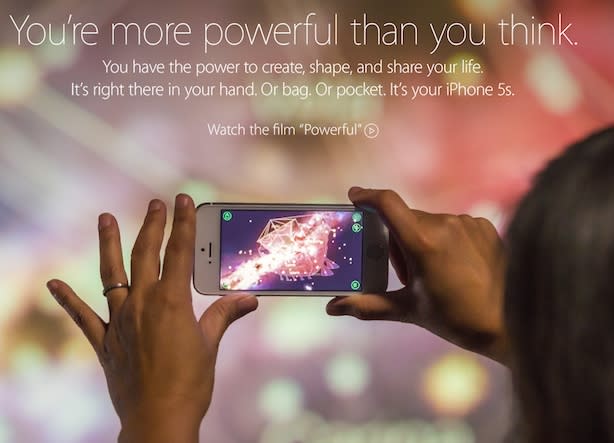Street artist claims Apple ripped off his inspirational slogan

A well-known New York City street artist named James De La Vega (no relation to Ralph) recently sent a cease-and-desist letter to Apple demanding that the company stop using the tagline "You're more powerful than you think" in its commercials.
James De La Vega says he's been using the phrase, "You are more powerful than you think," for almost a decade as part of his "Become Your Dream" series.
The Cornell University grad with a degree in fine arts has chalked his slogans onto sidewalks, painted them into murals and even incorporated them into a graffiti motif that designer Tory Burch used recently for a line of handbags and fashion accessories.
Apple's use of the allegedly trademarked phrase is rather new; it appears at the end of the company's recent iPhone 5s commercial -- appropriately titled "powerful", and also on a new page on Apple's website dedicated to interesting and creative iPhone use cases.
The C&D letter articulates that Apple's commercial operates to mislead consumers into thinking that De La Vega himself endorses the company's products. Given the localized nature of De La Vega's work, not to mention the fact that the phrase itself doesn't appear to be all that new or unique, I'm not sure that De La Vega has much of a leg to stand on. If anything, the slogan itself seems markedly similar to this much more famous quote from Marianne Williams: "Our deepest fear is that we are powerful beyond measure..."
De La Vega, though, claims that the phrase in question is so closely associated to him that a company that sells inspirational magnets even asked him for permission to use the phrase on one of their products.
The complaint asks that Apple stop using the phrase and acknowledge that De La Vega is the proper owner of the trademark. De La Vega is also seeking a settlement deal from the affair.
"Words are weapons," De La Vega explains. "This is my way of building a movement. [Apple] should pay me because I created it and they've used it to create national excitement about a product and huge profits for themselves."

